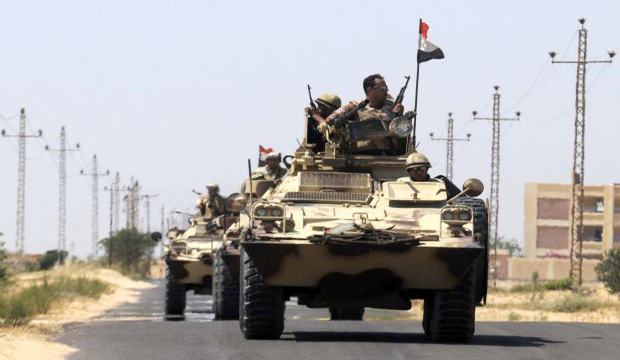
An Egyptian Army patrol on a road close to El Gorah in northeastern Sinai, Egypt, on May 21 2013. (EPA)
The two-day summit in Doha, scheduled to begin on Tuesday, will consider “adopting a collective position in support of stability in Egypt and its efforts to eradicate terror in the Sinai Peninsula,” a senior Gulf source, who requested anonymity because he was not authorized to brief the media, told Asharq Al-Awsat.
Egypt has been a major bone of contention for the GCC, which only recently recovered from one of the worst diplomatic crises in its 30-year history. While Qatar was accused of supporting the Egyptian Muslim Brotherhood, others, including Saudi Arabia, see in the now-banned Islamist group a threat to Egypt and the entire region. Riyadh and Abu Dhabi have been mobilizing support for Egyptian President Abdel-Fattah El-Sisi, who removed the group from power following nationwide public protests.
Developments in Egypt roiled the GCC, and saw Riyadh, Abu Dhabi and Manama recall their ambassadors from Doha for eight months.
Leaders of the GCC member states will also discuss the outcomes of the recent Riyadh agreement, which led to Saudi Arabia, the UAE, and Bahrain return their ambassadors to Qatar, the source maintained.
“The Doha Summit will be held at a very important time and in extremely critical circumstances, which undoubtedly requires more solidarity among the GCC countries,” the GCC Secretary-General Abdullatif Al-Zayani told Qatar News Agency (QNA) on Sunday.
The summit is also expected to tackle the issue of coordinating security and political efforts among its six member-states to address regional instability, authorize the establishment of a new Joint Military Command, and assess efforts to combat terrorism and radical groups.
The organization has been seeking to strengthen defense cooperation among its oil-rich members, with several reports circulating of plans to form a Joint Military Command to coordinate efforts against terrorist groups. The GCC already possesses a joint military formation known as the Peninsula Shield Force, which was established in 1982 and headquartered since in Saudi Arabia, though this was created with conventional military threats in mind.
Also on the agenda will be issues of tumbling world oil prices and ties with neighboring Iran, particularly fears that it is seeking to expand its regional influence, and fears among the Gulf states as to Tehran’s intentions regarding its nuclear program, currently the subject of negotiations between Iran and a number of world powers, including the US.
Zayani added that the GCC’s leaders had a full agenda to deal with at the annual summit, including “the critical situation and developments in the Arab region which have deep impact on GCC security and stability and on regional and international peace and security, especially in light of the increasing threat of extremist and terrorist organizations, the lack of a unified Arab stance, the unstable condition in some regional countries, the worsening humanitarian suffering of refugees and displaced persons in a number of Arab states, and the growing regional interventions in Arab affairs.”
According to the official, GCC is concentrating its efforts on combating terrorism on the basis that “terrorism has no religion or country, and it is alien to Islamic principles and Gulf soil.”
Fahad Al-Zayabi contributed reporting from Riyadh.

Trackbacks/Pingbacks